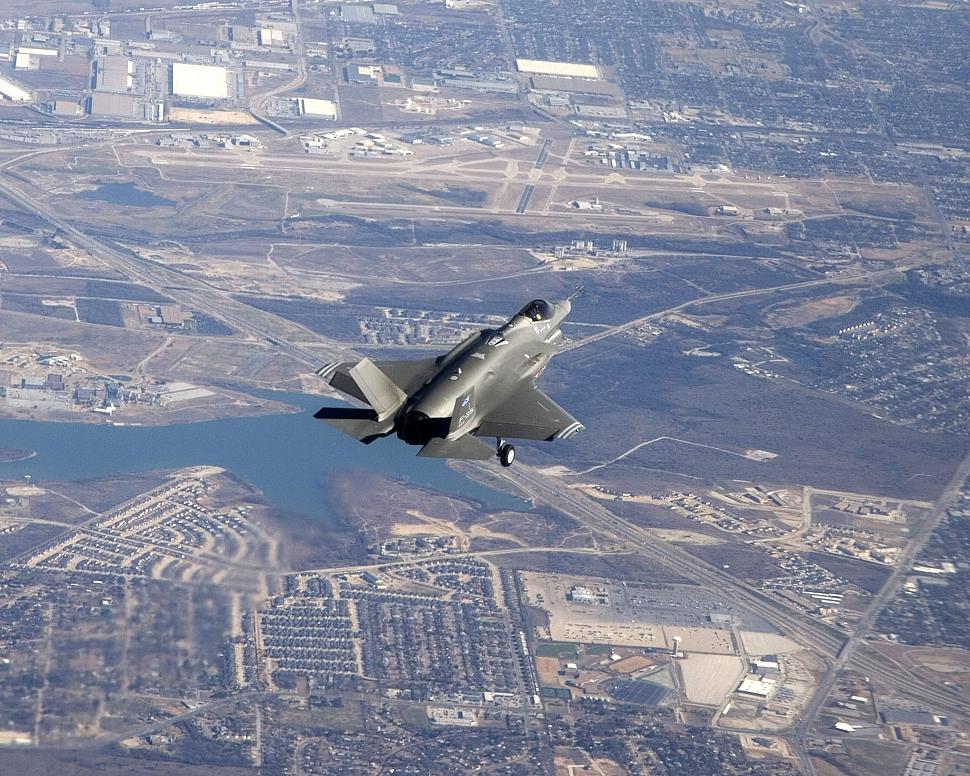Fighter Jet News
F-35 Lightning II News
Israel to buy 25 F-35 Joint Strike Fighter aircraft
October 5, 2008 (by
Lieven Dewitte) -
The U.S. government approved the sale of 25 F-35 jet fighters to Israel and an option for 50 more in coming years, for a deal valued at up to $15.2 billion.

The Pentagon's Defense Security Cooperation Agency (DSCA) said the deal is vital to U.S. national security interests to assist Israel as it develops and to maintain "a strong and ready self-defense capability." Israel says it needs the aircraft to enhance its air-to-air and air-to-ground defense.
The DSCA notified Congress about the proposed sale before lawmakers head back to their districts for the November election. Lawmakers now have 30 days to block the sales, but such action is rare, since the agreements are usually carefully vetted beforehand.
The sale would be the first to a country outside the US and eight partner nations that are collaborating on the F-35. The jet is still under development and is not yet in service, but the US plans to eventually acquire 2,458 planes for the Air Force, Navy and Marine Corps at a cost of $300 billion.
The next stage would be Israeli and American defense officials signing the agreement, enabling the provision of the aircraft by 2014.
The Pentagon agency said Israel wants to buy an initial 25 F-35s in the Conventional Take-Off and Landing (CTOL) configuration, with an option to buy an additional 50 F-35 CTOL or Short Take-Off and Vertical Landing (STOVL) aircraft.
All aircraft would be equipped with either the F-135 engine built by Pratt and Whitney or the F-136 engine being developed by General Electric and Britain's Rolls-Royce.
Top Israeli and U.S. officials met in Washington last month for the most senior bilateral high-tech talks between the two allies. Discussions focused in part on ensuring that sensitive technologies were not passed to third parties.
The F-35 can flying large distances without refueling and can cover the distance between Israel and Iran. It is designed to carry a variety of advanced weapons and radar devices.
The F-35 is considered the "last manned aircraft," as aviation experts believe aerial combat will be conducted largely by unmanned aircraft in the coming years.
Israel had expressed interest in acquiring the F-22, considered the only "fifth-generation" combat aircraft in the world, but was prevented from doing so by a U.S. Congress bill prohibiting its sale to any other countries in order to preserve the combat superiority of the U.S. Air Force.
Meanwhile, Lockheed Martin is expected to complete its sale of 102 F-16 aircraft to Israel by the end of the year.
The F-35 was designed as a replacement for a range of warplanes, including the F-16, which is a large component of many air forces worldwide. Besides Israel, countries such as Spain, Singapore and Japan also have expressed interest in the F-35.
None of the original eight foreign partner nations that have invested large sums of money in the F-35 development program have committed yet to firm production orders, although Britain and the Netherlands are purchasing a total of three test aircraft.
The Israeli Defense Ministry seems also to be seeking American approval to install Israeli-made technology on the F-35s. One reason for that would be to keep the IDFAF version unique and superior in case the aircraft is also sold to Saudi Arabia and other Middle Eastern countries.
"We have unique needs and need to retain our superiority in the region," a senior Israeli defense official was quoted as saying to The Jerusalem Post. . "To meet these needs, we must be able to install our own systems."
Israel enjoys the status of a Security Cooperation Participant after paying 20 million U.S. dollars in 2003 to obtain access to information accumulated during the development of the jet.
With the Iranian nuclear threat looming, Israel has been looking for further U.S. support on a variety of defense measures, including developing advanced missile defense capabilities, acquiring smart bomb technology.

Initial flight of the F-35 Lightning II on Dec. 15, 2006 over Fort Worth, Texas. [LMTAS photo by David Drais]
The DSCA notified Congress about the proposed sale before lawmakers head back to their districts for the November election. Lawmakers now have 30 days to block the sales, but such action is rare, since the agreements are usually carefully vetted beforehand.
The sale would be the first to a country outside the US and eight partner nations that are collaborating on the F-35. The jet is still under development and is not yet in service, but the US plans to eventually acquire 2,458 planes for the Air Force, Navy and Marine Corps at a cost of $300 billion.
The next stage would be Israeli and American defense officials signing the agreement, enabling the provision of the aircraft by 2014.
The Pentagon agency said Israel wants to buy an initial 25 F-35s in the Conventional Take-Off and Landing (CTOL) configuration, with an option to buy an additional 50 F-35 CTOL or Short Take-Off and Vertical Landing (STOVL) aircraft.
All aircraft would be equipped with either the F-135 engine built by Pratt and Whitney or the F-136 engine being developed by General Electric and Britain's Rolls-Royce.
Top Israeli and U.S. officials met in Washington last month for the most senior bilateral high-tech talks between the two allies. Discussions focused in part on ensuring that sensitive technologies were not passed to third parties.
The F-35 can flying large distances without refueling and can cover the distance between Israel and Iran. It is designed to carry a variety of advanced weapons and radar devices.
The F-35 is considered the "last manned aircraft," as aviation experts believe aerial combat will be conducted largely by unmanned aircraft in the coming years.
Israel had expressed interest in acquiring the F-22, considered the only "fifth-generation" combat aircraft in the world, but was prevented from doing so by a U.S. Congress bill prohibiting its sale to any other countries in order to preserve the combat superiority of the U.S. Air Force.
Meanwhile, Lockheed Martin is expected to complete its sale of 102 F-16 aircraft to Israel by the end of the year.
The F-35 was designed as a replacement for a range of warplanes, including the F-16, which is a large component of many air forces worldwide. Besides Israel, countries such as Spain, Singapore and Japan also have expressed interest in the F-35.
None of the original eight foreign partner nations that have invested large sums of money in the F-35 development program have committed yet to firm production orders, although Britain and the Netherlands are purchasing a total of three test aircraft.
The Israeli Defense Ministry seems also to be seeking American approval to install Israeli-made technology on the F-35s. One reason for that would be to keep the IDFAF version unique and superior in case the aircraft is also sold to Saudi Arabia and other Middle Eastern countries.
"We have unique needs and need to retain our superiority in the region," a senior Israeli defense official was quoted as saying to The Jerusalem Post. . "To meet these needs, we must be able to install our own systems."
Israel enjoys the status of a Security Cooperation Participant after paying 20 million U.S. dollars in 2003 to obtain access to information accumulated during the development of the jet.
With the Iranian nuclear threat looming, Israel has been looking for further U.S. support on a variety of defense measures, including developing advanced missile defense capabilities, acquiring smart bomb technology.
Related articles:
Forum discussion:
Tags
- The sale that isn't ( 2008-10-01)
- STOVL F-35B for Israel? ( 2008-03-10)
- F-35 in the Middle East ( 2007-11-15)
- Export concerns for the F-35 ( 2007-11-01)
- Israel planning to purchase 100 F-35 Joint Strike Fighters ( 2006-06-27)
- F-35 Lightning II news archive
Forum discussion:
- Start a discussion about this article in the F-35 forum.
Tags

